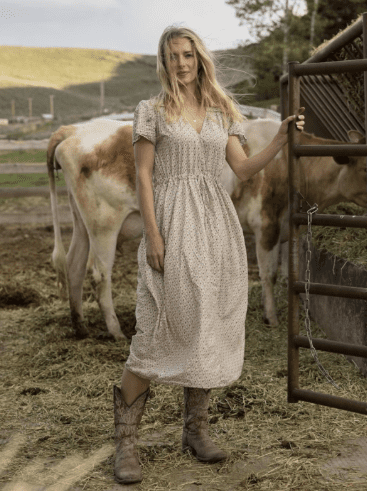
| The last five years have seen a viral trend called “Tradwife” take over social media. These accounts often have a Magnolia vibe similar to Joanna and Chip Gaines with cozy, curated homespun aesthetics. Much like the HGTV show that became a home-goods empire sold in stores like Target, tradwife accounts focus on a simple, domestic, idealized lifestyle. Tradwife is shortened from “Traditional Wife” and is very literally a return to the kitchen for the women doing it. Most share common values: living on a farm, homeschooling a large family, and promoting a return to an agricultural way of life. Some are controversial, aligning with RFK Jr.’s views or favoring natural remedies over modern medicine. While a few accounts focus on a 1950s housewife vibe, most aim for a heavily romanticized 1850s homestead lifestyle. Most followers aren’t living the Tradwife life themselves. They’re usually normal mothers looking for a little escape. One account posts a freshly baked cake from scratch every day. Another cooks elaborate meals in vintage ball gowns, narrating in an ASMR voice. These accounts are highly staged, and for many, the ridiculousness is part of the entertainment, but these accounts have a genuine fan base, too. |
| Last year, Ballerina Farms became the center of controversy. In one video, Hannah Neelman opens a gift from her husband—a simple apron with pockets for eggs—despite hinting she wanted a trip to Greece. Former tradwives have noted that the lifestyle is a moving target: once you’re baking cakes daily, next you’re supposed to mill your own flour by hand. Ballerina Farms, a family of eight, refuses childcare help at the husband’s request. Hannah and another influencer also sparked debate for using epidurals but waiting until their husbands weren’t present to request one.Hannah trained at Juilliard (hence the farm’s name), and her husband is one of nine children of the JetBlue founder. She was the first student to get pregnant while dating her now husband before graduation, and today they have eight children. Ballerina Farms now sells meat, dairy, and pricey home goods like mason jars and a $70 specialty protein powder. |
What does this say about wellness?
The tradwife trend points to a craving for simpler times: high-quality, locally sourced ingredients made with extreme attention to detail, all presented in a curated aesthetic. The appeal comes from rejecting today’s fast, complicated world—confusing labels, dizzying pharmaceuticals, impersonal medical systems. Tradwife accounts offer a DIY, back-to-basics fantasy, though ironically, it often requires a lot of labor and strict rules.
Unlike a real 1850s homestead, these accounts are always camera-ready, creating a sense of perfectionism. Accessing “pure” foods takes money, time, and effort. Avoiding additives or eating gluten-free is far from easy in the U.S., whereas in Europe, traditional breadmaking keeps gluten less of a concern. The Tradwife trend sells a rustic “wellness package” that, in order to access pure foods, one has to return to the labor-intensive olden days.
Most people aren’t becoming tradwives to avoid processed foods—but the popularity of these accounts shows a desire for a slower, more intentional life. The nostalgia and romanticism are obviously staged, but they reflect what people feel is missing in daily life. Even if it’s curated and idealized, it offers viewers a slice of what appears to be a simpler, more satisfying lifestyle.


